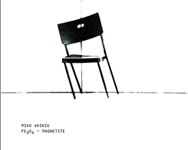|
|
 |
Dusted Reviews
Artist: Mika Vainio Album: Fe3O4 - Magnetite Label: Touch Review date: Sep. 10, 2012 |

|
|
|
 |
Amongst the ironies of Panasonic (later Pan Sonic) — the name that Finnish electronic musicians Mika Vaino and Ilpo Väisänen gave to their long-running and recently retired musical project — is this fact: While it implied an involvement with all sounds, they sure took their time getting beyond the elements of beats and tones. And to the very end, no matter how far they strayed from those essentials, they always returned to them. Vainio’s efforts under the name Ø could be even more reductive, while his work under his own name has tended toward extremes of loom and crumble; his last solo album Life (…it eats you up) is a massively heavy abstraction of guitar rock.
His new release, Fe304 - Magnetite, makes good on the Panasonic promise. Vainio seems comfortable using almost anything. At different points during its passage you’ll hear a solitary wood block, a clicking movie projector, a cymbal, a field recording of distant mall music, a shortwave radio not quite tuned into a station, some massive synth bass, and some flaking granite guitar noise. Beats, however, are pretty thin on the ground. In keeping with his past minimalist approach, sounds often appear in isolation, but Vainio seems more willing to overtly intervene with them; much of “Magnetosome,” for example, seems to be made out of stretched and transformed bell tones.
His taste in sounds and sense of what to do to them is unimpeachable, but the album’s greatest strength is its resistance to categorization. It has noisy moments, but it’s too spare to be noise. It uses field recordings, but not in a documentary fashion. It’s too uneasy and abruptly changeable to be ambient music, despite having long passages where things happen slowly. And while some of those long passages feel like slides mounted in a catalog of sounds, there is a spot tucked into the back end of “Magnetosense” that sounds like spooky movie music. What is this stuff? Hard to say, but that’s what keeps me coming back.
By Bill Meyer
|







